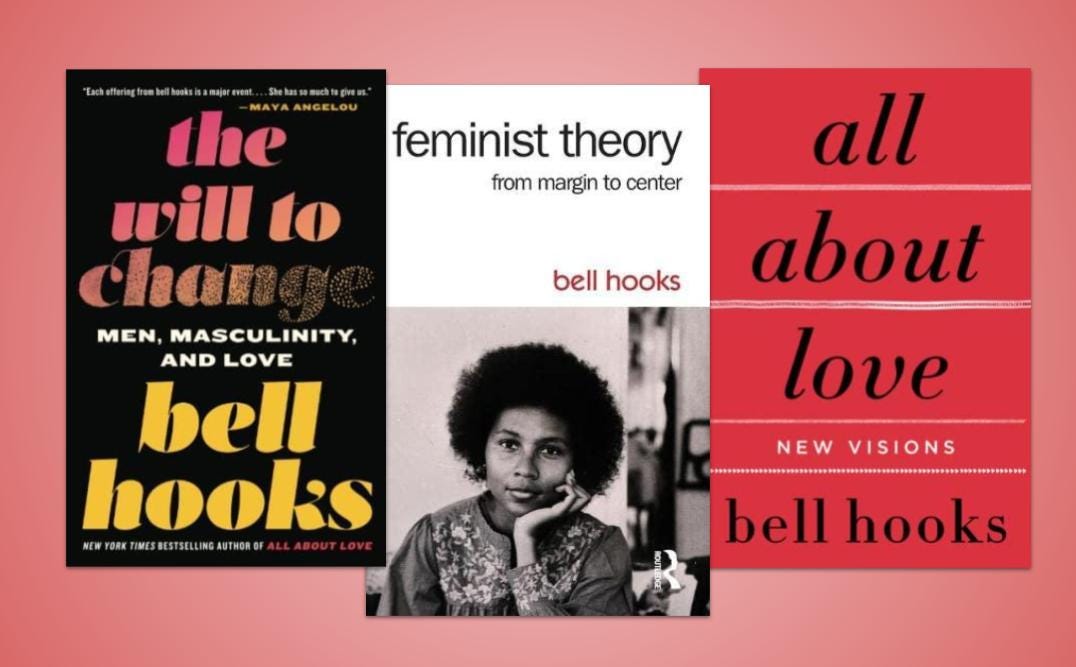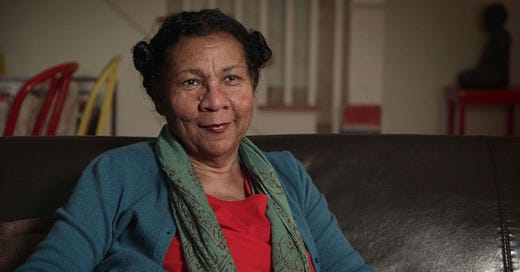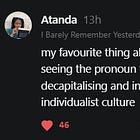beyond the bedroom: bell hooks' radical vision of queerness
redefining identity and resistance in the 21st century
tl;dr: bell hooks redefines queerness as a revolutionary stance against all forms of oppression, not just a sexual identity. discover how embracing your inner "outsider" could be the key to personal liberation and social change.
the first time i felt truly queer, it had nothing to do with who i was attracted to.
i was 13, freshly transplanted from puerto rico the night before to the stark aisles of a midwestern grocery store. my mom, navigating this new world with me, asked me to translate a label. as i began to explain in spanish, a stranger's voice cut through our conversation like ice: "you need to speak american here."
in that moment, barely 48 hours into our new life in western michigan, i felt profoundly, irreversibly out of place.
it was as if the ground beneath my feet had shifted, leaving me suspended between two worlds, belonging to neither. that feeling—a mix of confusion, anger, and a deep sense of otherness—has lived in my chest ever since, a constant reminder that to some, i shouldn't be here.
little did i know that years later, the words of bell hooks would give me a framework to understand this experience.
this feeling of displacement, this sense of existing outside the norm—this, too, was queerness. and it's at the heart of a revolutionary understanding of identity that hooks championed, one that goes far beyond sexuality to encompass all the ways we exist at odds with the world around us.

who is bell hooks?
for over three decades, this brilliant scholar, poet, and radical thinker has been challenging our assumptions about gender, race, class, and sexuality.
born gloria jean watkins, she chose the pen name bell hooks (intentionally lowercase) to honor her great-grandmother and to emphasize the importance of her ideas over her identity. this deliberate choice resonated deeply with me, inspiring my own decision to write in all lowercase—a small act of rebellion against conventional norms and a nod to the power of ideas over ego.
hooks' work is all about interconnection. she argues that we can't understand oppression without looking at how different systems of domination—racism, sexism, capitalism, homophobia—all work together.
it's like trying to untangle a massive knot - you can't just pull on one thread and expect the whole thing to come apart. her approach to writing, both in style and substance, showed me that even the way we present our words can be a form of resistance.
but hooks didn't just write about these ideas—she lived them, challenging our assumptions in real-time. nowhere is this more evident than in a 2014 panel that left audiences stunned, and continues to influence people like myself today. her legacy isn't just in her ideas, but in the way she encouraged us to express them, breaking down barriers one lowercase letter at a time.
redefining queerness
in 2014, and hooks is speaking on a panel called "are you still a slave? liberating the black female body." hooks dropped a bomb on the audience that day: "it may very well be that celibacy is the face of that liberatory sexuality."
she goes on to elaborate:
"i think of tim dean's work on being queer, queer as not being about who you're having sex with, that can be a dimension of it but queer as being about the self that is at odds with everything around it and has to invent and create and find a place to speak and to thrive and to live."
hooks is pushing us to see queerness not as a sexual identity, but as a state of being. it's about being the odd one out, the square peg in a round hole. it's about creating your own space in a world that wasn't built for you.
notably, she identified as "queer-pas-gay," ("queer-not-gay" in french) in this video. this is a term coined to express her identity. for hooks, this meant embracing queerness as a state of being that went beyond sexual orientation. it was about existing in opposition to societal norms, about constantly questioning and challenging the status quo. this identification allowed her to align herself with queer struggle and resistance without confining herself to traditional labels of sexual identity.
the radical potential of opting out
this idea isn't just radical—es revolucionaria, transformative in ways that, honestly, only i’m beginning to understand now.
in the video, hooks suggests that true sexual liberation might actually look like choosing not to have sex at all. "i'd rather not be sexual than to be sexual in any context where i'm being mistreated," she says.
now, i can hear some of you already: "edgard, are you saying we should all be celibate?" no, mi amor. para nada. that's not the point.
the point is that true freedom includes the power to say no, to opt out of systems that don't serve us.
intersectionality and queerness
this broader understanding of queerness is deeply intersectional. it recognizes that our identities don't exist in isolation. they overlap and interact, creating unique experiences of both oppression and resistance.
take audre lorde, for example. as a black lesbian feminist poet, her very existence was a challenge to multiple systems of oppression. her writing wasn't just about sexuality or race or gender—it was about how all these identities intersected to shape her experience of the world.
similarly, josé esteban muñoz, a queer latinx theorist, expanded on this idea of queerness as a way of being. he wrote about "disidentification"—a strategy for navigating mainstream culture while maintaining one's marginalized identity. it's about neither fully assimilating nor completely rejecting, but finding a third way.
adding to this constellation of queer thought is tim dean, whose work bell hooks specifically referenced in the quote from earlier. dean, a prominent queer theorist, pushes us to think about queerness beyond sexuality. in his groundbreaking work "beyond sexuality," dean argues that queerness is a way of relating to the world that challenges normative structures and imagines new forms of intimacy and community. his ideas align closely with hooks' vision of queerness as a state of being "at odds with everything around it."
these thinkers collectively paint a picture of queerness not just as an identity, but as a lens through which we can view and challenge the world.
they show us that being queer can be about more than who we love—it can be about how we love, how we think, and how we resist.
embodying queer resistance
embracing this kind of queerness isn't just about individual rebellion. it's about collective liberation. when we start seeing queerness as a way of being in the world, we open up new possibilities for solidarity and resistance.
imagine if we applied this queer thinking to education, to healthcare, to government.
what if we approached every system with the mindset of someone who doesn't quite fit, who has to invent new ways of being and doing?
so, how can we embody this broader sense of queerness in our daily lives? here are a few ideas:
question everything: challenge assumptions about "the way things should be," in your personal life and in society at large.
create new spaces: if you don't fit in existing spaces, create your own. start that weird club, write that unconventional story, make art that doesn't fit in neat categories. fuck. that. niche!
practice radical empathy: recognize how different forms of oppression intersect, and stand up for others even when their struggles don't directly affect you.
embrace discomfort: growth happens when we're uncomfortable. if you're not occasionally feeling out of place, you might not be pushing hard enough against the status quo.
celebrate non-conformity: in yourself and in others. remember, your "weirdness" is your strength.
addressing the controversy
now, i know this expanded view of queerness isn't without controversy. some worry it could dilute the specific experiences of lgbtq+ folks. others might see it as an attempt to claim "queer cred" without facing real-world discrimination.
these are valid concerns. but i'd argue that expanding our understanding of queerness doesn't diminish these experiences—it amplifies them. it shows how the liberation of lgbtq+ people is tied to other struggles for justice. it invites more people into the fight, creating a broader coalition for change.
in a world that often demands conformity, our queerness—in all its forms—is our superpower. it's the lens through which we see beyond the status quo, the force that drives us to create change. so let's embrace our queer chaos, mis amores. let's make the world a little more uncomfortably, beautifully queer every day.
as hooks herself said:
"… queer as being about the self that is at odds with everything around it and has to invent and create and find a place to speak and to thrive and to live."
that's not just about sexuality—it's about existence itself.
embracing your inner queer: a message for cis & straight allies
the beauty of hooks' expanded definition of queerness is that it invites everyone to examine how they exist in relation to societal norms.
have you ever felt like an outsider in your workplace because you prioritize family over career advancement? that's a form of queerness. maybe you're passionate about environmental activism in a community that's skeptical about climate change. guess what? that's queer too.
the point isn't to appropriate lgbtq+ experiences, but to recognize that we all have moments of being "at odds with everything around us."
by embracing these moments, you can:
build genuine empathy with marginalized communities
challenge oppressive systems that affect everyone
create more inclusive spaces in our daily lives
for example, a straight man questioning toxic masculinity is engaging in a form of queer resistance. a cis woman rejecting beauty standards is embracing queer philosophy. these acts of non-conformity, while different from lgbtq+ experiences, still challenge societal norms and contribute to a more inclusive world.
by understanding queerness in this broader sense, cis and straight individuals can become more effective allies. it's not about claiming a queer identity. it’s about recognizing the value of queer thought in creating a more just and accepting society for everyone.
queer revolution starts here
in the end, hooks' vision of queerness isn't just about lgbtq+ identity.
it's a radical call for all of us to embrace our authentic selves, even when—especially when—those selves don't fit neatly into society's boxes.
think about it: we've all had moments where we felt like we didn't belong. maybe it was in a classroom where your ideas were too "out there," or at a family gathering where your values clashed with tradition. perhaps it was standing in a grocery store, caught between languages and cultures, feeling the sting of otherness.
these moments of discomfort, of not fitting in? they're not weaknesses. they're portals to a more authentic, liberated existence. they're invitations to question, to challenge, to create new ways of being in the world.
so, mi gente, whether you're gay, straight, trans, cis, or still figuring it out—i challenge you to embrace your inner queer. question the norms that constrain you. create spaces where you and others can thrive in all your beautiful complexity. stand in solidarity with those whose queerness puts them at risk.
because when we all embrace our queer chaos, when we celebrate the ways we're "at odds with everything around us," we create a world with more room for everyone to exist freely. and isn't that the kind of world we all want to live in?
let's make it happen, one queer act of resistance at a time. ✊🏽
hasta la próxima, mis amores! 💖
edgard✊🏽🌈
p.s. if this essay made you think differently about queerness, share it with someone who might need a new perspective.
p.p.s. and remember, in the immortal words of audre lorde, "it is not our differences that divide us. it is our inability to recognize, accept, and celebrate those differences." so go out there and celebrate your difference, your queerness, your unique way of being in the world. make it count. make it revolutionary. make it queer as hell.









